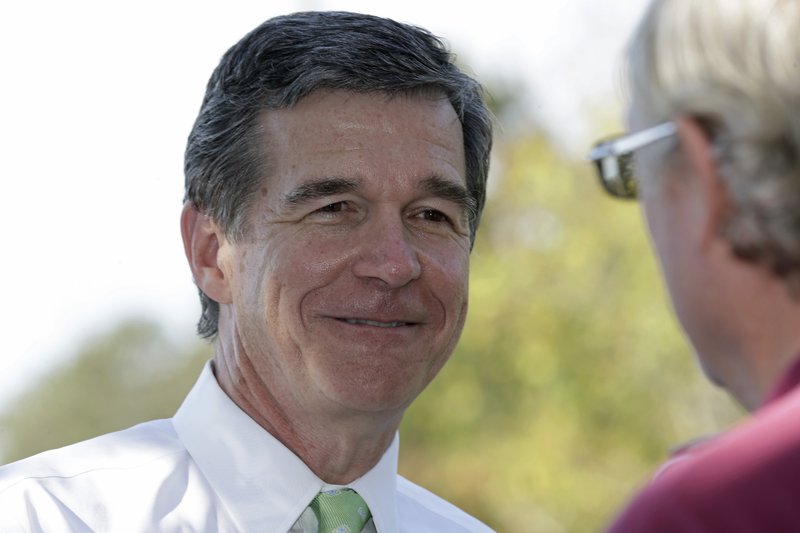GREENSBORO, N.C. -- Republican Gov. Pat McCrory has been unable to quash the firestorm over his signing of a law limiting protections for, gay, bisexual and transgender people, while trying to focus his re-election bid on North Carolina's economy, taxes, teacher pay and his recent response to destructive flooding.
That legislation has reinforced the election as a referendum on North Carolina's conservative shift under McCrory and the Republican-led Legislature. The gubernatorial contest is one of the nation's most competitive, with several polls showing McCrory and Democratic Attorney General Roy Cooper in a statistical tie.
Cooper wants to repeal the law known as House Bill 2, which among other things directs transgender people to use restrooms in schools and government buildings that correspond to the sex on their birth certificates. He also says he'll work to restore the state's progressive image if elected and has rolled out an ad blasting the law, saying it's "trashed our brand" and cost thousands of jobs.
"North Carolina is better than this. We always have been. We will be again," Cooper, the state's attorney general since 2001, told dozens of Democratic volunteers in Greensboro.
McCrory got a shot at resetting the campaign narrative this month after flooding triggered by Hurricane Matthew, as he made near-daily appearances on the news leading response and recovery efforts. One of his recent ads shows footage from the storm and the riots sparked by the fatal shooting of a black man by Charlotte police.
"The last four years I've focused on my job as governor. The campaign has always been secondary," McCrory said in an interview, adding that with "any event that happens in a state ... you just do your job. But I assume if we didn't do it right, there would be political ramifications."
The state's response earned McCrory support even from Democrats, such as David Parker, 72, of Rocky Mount. He said he voted for McCrory because he has "stood out during Hurricane Matthew and been very responsive to the people in eastern North Carolina that have been in some problems." Flooding from Matthew overwhelmed Rocky Mount roads and other buildings and rose to 7 feet in downtown Princeville nearby. McCrory visited the two towns in the past week.
The Cooper-McCrory campaign basically began in 2013 after Cooper, a 30-year veteran of state politics, started speaking out against legislation approved by the Republican-controlled General Assembly and signed by McCrory. They included a wide-ranging ballot access law that required photo identification to vote and scaled back early in-person voting by seven days.
A federal appeals court in July struck down the voter law as racially motivated, giving further proof to those angry with McCrory about House Bill 2 that he hasn't led like the moderate former seven-term Charlotte mayor they thought they were getting when he was elected in 2012.
"Anyone who lives in North Carolina has now been hurt by something that a few individuals think they can pass," said William Brinkley, 27, a registered independent from Charlotte who voted for McCrory in 2012. He said recently that he won't this time.
Cooper is "for everything that I stand for," said Charles Upchurch, 76, of Raleigh, a registered Democrat wearing an NAACP shirt and waiting to vote in downtown Raleigh. "Jobs for one, but right now justice. ... Civil rights for everybody. We want justice whenever we go to our courts, justice when we go downtown to the police station."
McCrory points to a record of lower income taxes, unemployment under 5 percent and a fiscally sound state budget. Cooper said the tax cuts helped the highest income earners the most and took away funds to help move teacher salaries to the national average.
Hardly a public event goes by where McCrory doesn't answer a media question about House Bill 2.
But the governor has retained support among social conservatives by defending the law. Republicans have said the law provides privacy and protection for children using restrooms and locker rooms.
"I believe he's got the state on a good moral course," said Jerry O'Carroll, 69, a registered Republican.
A Section on 10/30/2016
